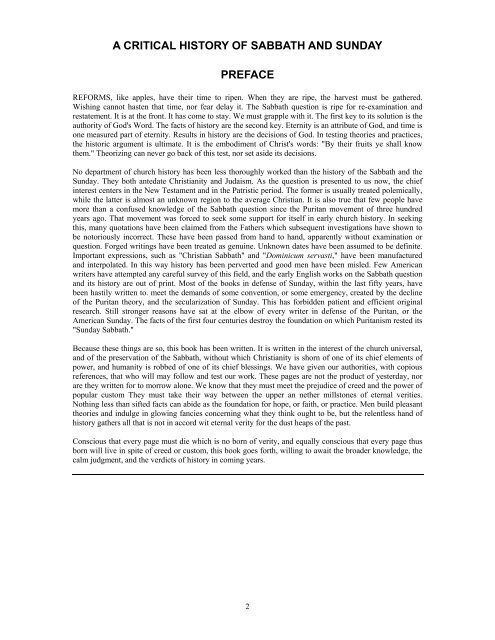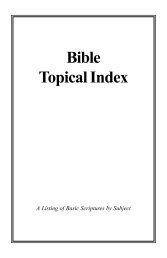a critical history of sabbath - Giving And Sharing
a critical history of sabbath - Giving And Sharing
a critical history of sabbath - Giving And Sharing
Create successful ePaper yourself
Turn your PDF publications into a flip-book with our unique Google optimized e-Paper software.
A CRITICAL HISTORY OF SABBATH AND SUNDAY<br />
PREFACE<br />
REFORMS, like apples, have their time to ripen. When they are ripe, the harvest must be gathered.<br />
Wishing cannot hasten that time, nor fear delay it. The Sabbath question is ripe for re-examination and<br />
restatement. It is at the front. It has come to stay. We must grapple with it. The first key to its solution is the<br />
authority <strong>of</strong> God's Word. The facts <strong>of</strong> <strong>history</strong> are the second key. Eternity is an attribute <strong>of</strong> God, and time is<br />
one measured part <strong>of</strong> eternity. Results in <strong>history</strong> are the decisions <strong>of</strong> God. In testing theories and practices,<br />
the historic argument is ultimate. It is the embodiment <strong>of</strong> Christ's words: "By their fruits ye shall know<br />
them." Theorizing can never go back <strong>of</strong> this test, nor set aside its decisions.<br />
No department <strong>of</strong> church <strong>history</strong> has been less thoroughly worked than the <strong>history</strong> <strong>of</strong> the Sabbath and the<br />
Sunday. They both antedate Christianity and Judaism. As the question is presented to us now, the chief<br />
interest centers in the New Testament and in the Patristic period. The former is usually treated polemically,<br />
while the latter is almost an unknown region to the average Christian. It is also true that few people have<br />
more than a confused knowledge <strong>of</strong> the Sabbath question since the Puritan movement <strong>of</strong> three hundred<br />
years ago. That movement was forced to seek some support for itself in early church <strong>history</strong>. In seeking<br />
this, many quotations have been claimed from the Fathers which subsequent investigations have shown to<br />
be notoriously incorrect. These have been passed from hand to hand, apparently without examination or<br />
question. Forged writings have been treated as genuine. Unknown dates have been assumed to be definite.<br />
Important expressions, such as "Christian Sabbath" and "Dominicum servasti," have been manufactured<br />
and interpolated. In this way <strong>history</strong> has been perverted and good men have been misled. Few American<br />
writers have attempted any careful survey <strong>of</strong> this field, and the early English works on the Sabbath question<br />
and its <strong>history</strong> are out <strong>of</strong> print. Most <strong>of</strong> the books in defense <strong>of</strong> Sunday, within the last fifty years, have<br />
been hastily written to. meet the demands <strong>of</strong> some convention, or some emergency, created by the decline<br />
<strong>of</strong> the Puritan theory, and the secularization <strong>of</strong> Sunday. This has forbidden patient and efficient original<br />
research. Still stronger reasons have sat at the elbow <strong>of</strong> every writer in defense <strong>of</strong> the Puritan, or the<br />
American Sunday. The facts <strong>of</strong> the first four centuries destroy the foundation on which Puritanism rested its<br />
"Sunday Sabbath."<br />
Because these things are so, this book has been written. It is written in the interest <strong>of</strong> the church universal,<br />
and <strong>of</strong> the preservation <strong>of</strong> the Sabbath, without which Christianity is shorn <strong>of</strong> one <strong>of</strong> its chief elements <strong>of</strong><br />
power, and humanity is robbed <strong>of</strong> one <strong>of</strong> its chief blessings. We have given our authorities, with copious<br />
references, that who will may follow and test our work. These pages are not the product <strong>of</strong> yesterday, nor<br />
are they written for to morrow alone. We know that they must meet the prejudice <strong>of</strong> creed and the power <strong>of</strong><br />
popular custom They must take their way between the upper an nether millstones <strong>of</strong> eternal verities.<br />
Nothing less than sifted facts can abide as the foundation for hope, or faith, or practice. Men build pleasant<br />
theories and indulge in glowing fancies concerning what they think ought to be, but the relentless hand <strong>of</strong><br />
<strong>history</strong> gathers all that is not in accord wit eternal verity for the dust heaps <strong>of</strong> the past.<br />
Conscious that every page must die which is no born <strong>of</strong> verity, and equally conscious that every page thus<br />
born will live in spite <strong>of</strong> creed or custom, this book goes forth, willing to await the broader knowledge, the<br />
calm judgment, and the verdicts <strong>of</strong> <strong>history</strong> in coming years.<br />
2



